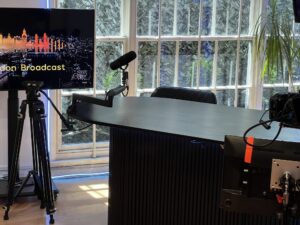Yesterday Paul and Guy were at a client site in Loughborough – Paul on cameras and visual advice and Guy doing the content as per usual. They visited the client at their office and did two half-day sessions, bringing an eight-session engagement to a close for the moment.
Nect week they’ll be in London doing the same for another client. There’s more, though.
We can now get you into a TV studio.
You need to experience the studio
 Studio work is very different. It involves waiting in a green room, getting called in front of the camera and as per our other offerings, getting immediate feedback. If your client needs to go in front of the camera in a proper TV studio or indeed an upmarket podcast studio then frankly they’ll do better after a dry run. Rather than sit in front of a journalist or podcaster in an hostile environment without any prep they’ll benefit from starting off with an experienced trainer and camera professional who can explain what’s happening, why things are done the way they are and above all put them through their paces. It’s a safe place to mess up.
Studio work is very different. It involves waiting in a green room, getting called in front of the camera and as per our other offerings, getting immediate feedback. If your client needs to go in front of the camera in a proper TV studio or indeed an upmarket podcast studio then frankly they’ll do better after a dry run. Rather than sit in front of a journalist or podcaster in an hostile environment without any prep they’ll benefit from starting off with an experienced trainer and camera professional who can explain what’s happening, why things are done the way they are and above all put them through their paces. It’s a safe place to mess up.
The studio to which we can have access offers a podcast/radio area and two TV studios, one for a sofa-based daytime TV environment and one for an experience more like they’d find on a news programme. We’ll offer presentations to guide your client in terms of techniques to use in interviews and give them a genuine feel about what a studio feels like.
If your client is headed for the TV studio, let us know – we’d be pleased to help. Just drop Lindsay a note and she’ll line us up with an initial chat.
